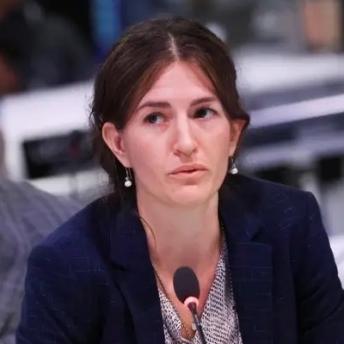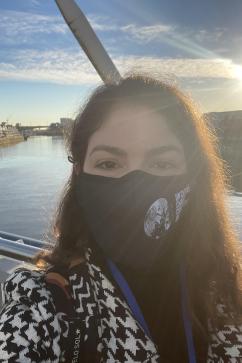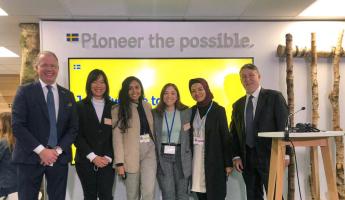
The annual “conference of the parties” hosted by the UN Framework Convention on Climate Change, COP26, held in November 2021 in Glasgow, was a critical gathering of climate experts centered on decision-making and discussions of reducing global greenhouse gas emissions. In addition to the dozens of Yale students, faculty, and staff taking part, alumni from the Yale School of the Environment brought their expertise to the negotiations during the two-week conference, playing a major role and making headlines in the global media.

Lia Nicholson ’14 MEM
Nicholson was the lead negotiator for the Alliance of Small Island States (AOSIS), a United Nations bloc of 39 Small Island Developing States (SIDS) that, although economically small, constitute 20% of all U.N. Member States. Ahead of COP26, Lia led several days of SIDS preparatory meetings to refine group positions, working closely with the fifteen AOSIS coordinators that speak on behalf of the group in each thematic negotiation.
Nicholson spoke on behalf of AOSIS in the Glasgow Climate Pact negotiations, forwarding three main goals: finalizing the Paris Agreement rulebook, including the conclusion of negotiations on the carbon market mechanism and transparent reporting under the agreement; raising ambition to limit warming to 1.5-degrees, across mitigation; and securing new and additional financing that would support SIDS to cope with ongoing loss and damage due to climate change.
"COP26 was an exhilarating experience,” Nicholson says. “A key success for us this year was securing a historic call to phase-out fossil fuel subsidies in the COP26 decision text. Incredibly, the UNFCCC has never before singled out the words “fossil fuels;” usually we just talk vaguely about trajectories and pathways.”
At the conference, Nicholson said she was “extremely disappointed” by the lack of financing for loss and damage for countries already feeling the worst effects of climate change — remarks that made headlines in major media outlets like the BBC and The New York Times.
“At COP26's conclusion, it's already time to start planning for next year's positions and strategy,” says Nicholson. “The world is not yet moving fast enough to prevent the worst impacts of climate change and protect our island nations."

Sam Teicher ’15 MEM
Teicher attended COP26 on behalf of Coral Vita, which he founded with Gator Halpern ’15 MEM as YSE students, using seed funding from the Tsai Center for Innovative Thinking at Yale. Coral Vita works to scale reef restoration to preserve ocean ecosystems for future generations; last year, the company won the inaugural Earthshot Prize, a new global environmental prize that provides financial backing to scale up innovative solutions to the climate crisis.
Invited by the prize’s founder, Prince William, Teicher was featured at the World Leaders Summit, introduced to the U.N. Secretary General, and met with environmental, business, philanthropic and finance leaders.
"As far as things I'd never thought I'd say in my life, there aren't many better wingmen than Prince William.,” says Teicher. “It's clear how much protecting biodiversity and communities matters to him, and so much of his presence at COP26 was dedicated to bringing together leaders and people of influence and calling on them to assist us Earthshot Prize winners and finalists.
“Grounded in the realism of the challenges we face, I remain optimistic about our ability to solve problems and make the world a better place."

Anna Maria Carcamo ’19 MEM
As a YSE student, Carcamo attended COP23 in Bonn, Germany, and COP24 in Katowice, Poland, taking classes in climate change negotiations and global environmental governance. Now a fellow at the Legal Affairs Division of the United Nations Framework Convention (UNFCCC) Secretariat and the United Nations University (UNU), she attended COP26 “on the other side” of the conference, supporting intergovernmental negotiations and capacity-building on international climate change law.
The fellowship program selects 10 young professionals from developing countries specialized on climate change to work in the area of their expertise. (Carcamo is a native of Brazil.) She provided legal advice on the discussions of the Subsidiary Bodies of the UNFCCC, on topics including adaptation, gender, and loss and damage.
“I learned so much about the process and all the work that goes into [the conference] coming to consensus and paths forward,” Carcamo says. “I was very honored to have taken part in this meeting, which was challenging yet instrumental to advance several discussions and to finalize the Paris Agreement's Rulebook.”
Published
January 13, 2022

